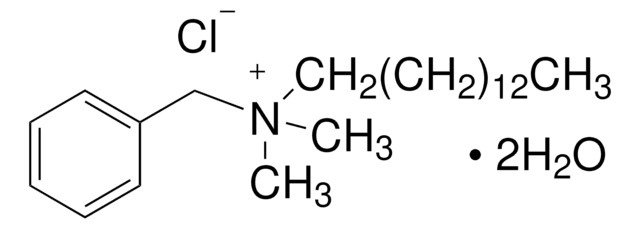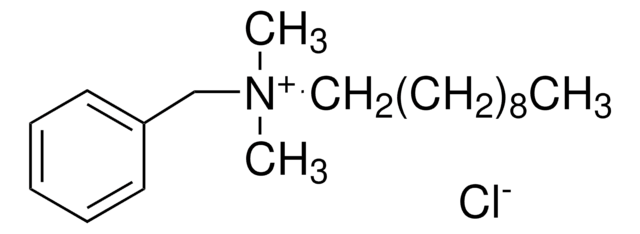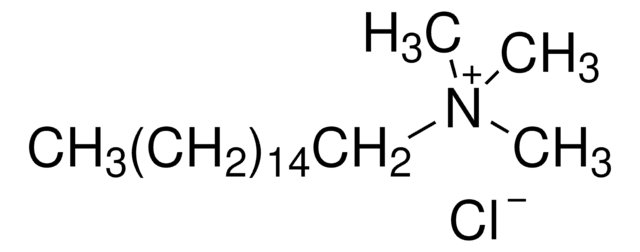B4136
Benzyldimethylhexadecylammonium chloride
cationic detergent
Sinónimos:
16-BAC, Benzylhexadecyldimethylammonium chloride, Cetalkonium chloride, Cetyldimethylbenzylammonium chloride
About This Item
Productos recomendados
Quality Level
form
powder
mol wt
396.09 g/mol
mp
55-65 °C (lit.)
storage temp.
room temp
SMILES string
[Cl-].CCCCCCCCCCCCCCCC[N+](C)(C)Cc1ccccc1
InChI
1S/C25H46N.ClH/c1-4-5-6-7-8-9-10-11-12-13-14-15-16-20-23-26(2,3)24-25-21-18-17-19-22-25;/h17-19,21-22H,4-16,20,23-24H2,1-3H3;1H/q+1;/p-1
InChI key
SXPWTBGAZSPLHA-UHFFFAOYSA-M
¿Está buscando productos similares? Visita Guía de comparación de productos
General description
Application
signalword
Danger
hcodes
Hazard Classifications
Acute Tox. 4 Oral - Aquatic Acute 1 - Aquatic Chronic 1 - Eye Dam. 1 - Skin Corr. 1B
Storage Class
8A - Combustible corrosive hazardous materials
wgk_germany
WGK 2
flash_point_f
143.6 °F - Pensky-Martens closed cup
flash_point_c
62 °C - Pensky-Martens closed cup
ppe
Eyeshields, Faceshields, Gloves, type P3 (EN 143) respirator cartridges
Certificados de análisis (COA)
Busque Certificados de análisis (COA) introduciendo el número de lote del producto. Los números de lote se encuentran en la etiqueta del producto después de las palabras «Lot» o «Batch»
¿Ya tiene este producto?
Encuentre la documentación para los productos que ha comprado recientemente en la Biblioteca de documentos.
Los clientes también vieron
Nuestro equipo de científicos tiene experiencia en todas las áreas de investigación: Ciencias de la vida, Ciencia de los materiales, Síntesis química, Cromatografía, Analítica y muchas otras.
Póngase en contacto con el Servicio técnico










